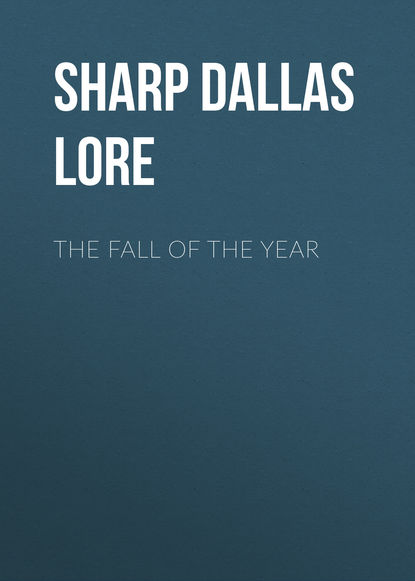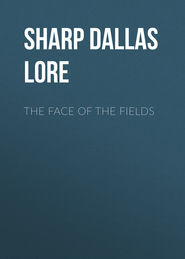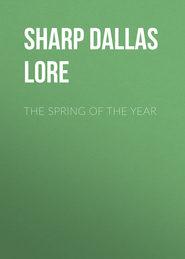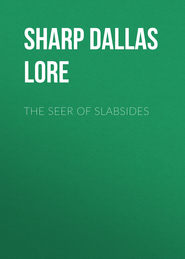По всем вопросам обращайтесь на: info@litportal.ru
(©) 2003-2024.
✖
The Fall of the Year
Настройки чтения
Размер шрифта
Высота строк
Поля
The dogs were coming, but I was standing still. And who was I, anyway? A stump? A post? No, he saw instantly that I was more than an ordinary post. How much more?
The dogs were coming!
“Well,” said he, as plainly as anything was ever said, “I don’t know what you are. But I will find out.” And up he came and sniffed at my shoes. “This is odd,” he went on, backing carefully off and sitting down on his tail in the edge of a pine-tree shadow. “Odd indeed. Not a stump; not a man, in spite of appearances, for a man could never stand still so long as that.”
The dogs were crashing through the underbrush below, their fierce cries quivering through the very trees about me.
The fox got up, trotted back and forth in front of me for the best possible view, muttering, “Too bad! Too bad! What an infernal nuisance a pack of poodles can make of themselves at times! Here is something new in the woods, and smells of the hen-yard, as I live! Those silly dogs!” and trotting back, down the path over which he had just come, he ran directly toward the coming hounds, leaped off into a pile of brush and stones, and vanished as the hounds rushed up in a yelping, panting whirl about me.
Cool? Indeed it was! He probably did not stop, as soon as he was out of sight, and make faces at the whole pack. But that is because they have politer ways in Foxland.
It is no such walking-match as this every time. It is nip and tuck, neck and neck, a dead heat sometimes, when only his superior knowledge of the ground saves the fox a whole skin.
Perhaps there are peculiar conditions, at times, that are harder for the fox than for the dogs, as when the undergrowth is all adrip with rain or dew, and every jump forward is like a plunge overboard. His red coat is longer than the short, close hair of the hound, and his big brush of a tail, heavy with water, must be a dragging weight over the long hard course of the hunt. If wet fur to him means the same as wet clothes to us, then the narrow escape I witnessed a short time ago is easily explained. It happened in this way: —
I was out in the road by the brook when I caught the cry of the pack; and, hurrying up the hill to the “cut,” I climbed the gravel bank for a view down the road each way, not knowing along which side of the brook the chase was coming, nor where the fox would cross.
Not since the Flood had there been a wetter morning. The air could not stir without spilling; the leaves hung weighted with the wet; the very cries of the hounds sounded thick and choking, as the pack floundered through the alder swamp that lay at the foot of the hill where I was waiting.
There must be four or five dogs in the pack, I thought; and surely now they are driving down the old runway that crosses the brook at my meadow.
I kept my eye upon the bend in the brook and just beyond the big swamp maple, when there in the open road stood the fox.
He did not stand; he only seemed to, so suddenly and unannounced had he arrived. Not an instant had he to spare. The dogs were smashing through the briars behind him. Leaping into the middle of the road, he flew past me straight up the street, over the ridge, and out of sight.
I turned to see the burst of the pack into the road, when flash! a yellow streak, a rush of feet, a popping of dew-laid dust in the road, and back was the fox, almost into the jaws of the hounds, as he shot into the tangle of wild grapevines around which the panting pack was even then turning!
With a rush that carried them headlong past the grapevines, the dogs struck the warm trail in the road and went up over the hill in a whirlwind of dust and howls.
They were gone. The hunt was over for that day. Somewhere beyond the end of the doubled trail the pack broke up and scattered through the woods, hitting a stale lead here and there, but not one of them, so long as I waited, coming back upon the right track to the grapevines, through whose thick door the hard-pressed fox had so narrowly won his way.
CHAPTER III
IN THE TOADFISH’S SHOE
I WAS winding up my summer vacation with a little fishing party all by myself, on a wharf whose piles stood deep in the swirling waters from Buzzards Bay. My heavy-leaded line hummed taut in the swift current; my legs hung limp above the water; my back rested comfortably against a great timber that was warm in the September sun. Exciting? Of course not. Fishing is fishing – any kind of fishing is fishing to me. But the kind I am most used to, and the kind I like best, is from the edge of a wharf, where my feet dangle over, where my “throw-out” line hums taut over my finger, in a tide that runs swift and deep and dark below me.
For what may you not catch in such dark waters? And when there are no “bites,” you can sit and wait; and I think that sitting and waiting with my back against a big warm timber is just as much fun now as it used to be when I was a boy.
But after all it is fish that you want when you go fishing; and it is exciting, moreover, just to sit as I was sitting on the wharf, with all the nerves of your body concentrated in the tip of your right forefinger, under the pressure of your line. For how do you know but that the next instant you may get a bite? And how do you know what the fish may be?
When you whip a trout stream for trout – why, you expect trout; when you troll a pond for pickerel, you expect pickerel; but when you sit on a wharf with your line far out in big, deep waters – why, you can expect almost anything – except shoes!
Shoes? Yes, old shoes!
As I sat there on the wharf of Buzzards Bay, there was suddenly a sharp tug at my line. A short quick snap, and I hooked him, and began quickly hauling him in.
How heavily he came! How dead and stupid! Even a flounder or a cod would show more fight than this; and very naturally, for on the end of my line hung an old shoe!
“Well,” I thought, “I have fished for soles, and down on the Savannah I have fished for ’gators, but I never fished for shoes before”; and taking hold of my big fish (for it must have been a No. 12 shoe), I was about to feel for the hook when I heard a strange grunting noise inside, and nearly tumbled overboard at sight of two big eyes and a monstrous head filling the whole inside of the shoe!
“In the name of Davy Jones!” I yelled, flinging line and shoe and thing (whatever it might be) far behind me, “I’ve caught the Old Man of the Sea with his shoe on!” And, scrambling to my feet, I hurried across the wharf to see if it really were a fish that now lay flapping close beside the shoe.
It was really a fish; but it was also a hobgoblin, nightmare, and ooze-croaker! – if you know what that is!
I had never seen a live toadfish before, and it is small wonder that I sighed with relief to see that he had unhooked himself; for he looked not only uncanny, but also dangerous! He was slimy all over, with a tremendous head and a more tremendous mouth (if that could be), with jaws studded on the inside with rows of sharp teeth, and fringed on the outside with folds of loose skin and tentacles. Great glaring eyes stared at me, with ragged bits of skin hanging in a ring about them.
Ugly? Oh, worse than ugly? Two thirds of the monster was head; the rest, a weak, shapeless, slimy something with fins and tail, giving the creature the appearance of one whose brain had grown at the expense of the rest of his body, making him only a kind of living head.
I looked at him. He looked at me, and croaked.
“I don’t understand you,” said I, and he croaked again. “But you are alive,” said I; “and God made you, and therefore you ought not to look so ugly to me,” and he flapped in the burning sun and croaked again.
Stooping quickly, I seized him, crowded him back into the old shoe, and dipped him under water. He gasped with new life and croaked again.
“Now,” said I, “I begin to understand you. That croak means that you are glad to taste salt water again”; and he croaked again, and I dipped him in again.
Then I looked him over thoughtfully. He was about fifteen inches long, brown in color, and coarsely marbled with a darker hue, which ran along the fins in irregular wavy lines.
“You are odd, certainly, and peculiar, and altogether homely,” said I; “but really you are not very ugly. Ugly? No, you are not ugly. How could anybody be ugly with a countenance so wise and learned? – so thoughtful and meditative?” And the toadfish croaked and croaked again. And I dipped him in again, and understood him better, and liked him better all the time.
Then I took him in his shoe to the edge of the wharf.
“I am glad to have made your acquaintance, sir,” said I. “If I come this way next summer, I shall look you up; for I want to know more about you. Good-by.” And I heard him croak “Good-by,” as he and his shoe went sailing out and dropped with a splash into the deep dark water of the Bay.
I meant what I said, and the next summer, along the shores of the Bay I hunted him up. He was not in an old shoe this time, but under certain rather large stones that lay just below ebb-tide mark, so that they were usually, though not always, covered with water. Here I found him keeping house; and as I was about to keep house myself, my heart really warmed to him.
I was understanding him more and more, and so I was liking him better and better. Ugly? Wait until I tell you what the dear fellow was doing.
He was keeping house, and he was keeping it all alone! Now listen, for this is what I learned that summer about the strange habits of Mrs. Toadfish, and the handsome behavior of her husband.
It is along in June that the toadfish of our New England bays begin to look round for their summer homes. As far as we now know, it is the female who makes the choice and leaves her future mate to find her and her home. A rock is usually chosen, always in shallow water, and sometimes so far up on the shore that at low tide it is left high and almost dry. The rock may vary in size from one as small as your hat up to the very largest.
Having selected the place for her nest, she digs a pathway down under the rock, and from beneath scoops out a hollow quite large enough to swim round in. This completes the nest, or more properly burrow, in which her little toadfish babies are to be reared.
She now begins to lay the eggs, but not in the sand, as one would suppose; she deliberately pastes them on the under surface of the rock. Just how she does this no one knows.
The eggs are covered with a clear, sticky paste which hardens in contact with water, and is the means by which the mother sticks them fast to the rock. This she must do while swimming on her back, fastening one egg at a time, each close beside its neighbor in regular order, till all the cleared surface of the rock is covered with hundreds of beautiful amber eggs, like drops of pure, clear honey.
The eggs are about the size of buckshot; and, curiously enough, when they hatch, the young come out with their heads all turned in the same direction. Does the mother know which is the head end of the egg? Or has some strange power drawn them around? Or do they turn themselves for some reason?
It will be noticed, in lifting up the rocks, that the heads of the fish are always turned toward the entrance to their nest, through which the light and fresh water come; and it is quite easy to see that these two important things have much to do with the direction in which the little fish are turned.
After Mrs. Fish has finished laying her eggs, her maternal cares are over. She leaves both eggs and cares to the keeping of Mr. Fish, swims off, and crawls into a tin can – or old shoe! – to meditate in sober satisfaction for the rest of the summer.
So it was she that I caught, and not the gallant Mr. Toadfish at all! I am glad of it. I have a deal of sympathy and down-right admiration for Mr. Fish. He behaves most handsomely.
However, Mrs. Fish is very wise, and could not leave her treasures in better keeping. If ever there was a faithful parent, it is a Father Toadfish. For three weeks he guards the eggs before they hatch out, and then they are only half hatched; for it has taken the little fish all this time to get out on the top side of the eggs, to which they are still attached by their middles, so that they can move only their heads and tails.











